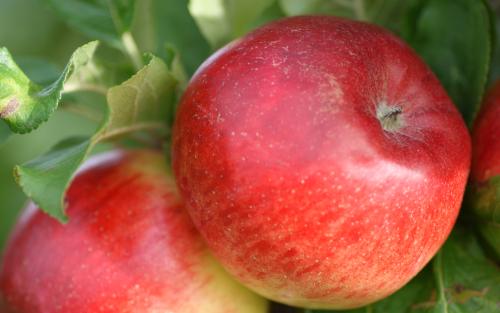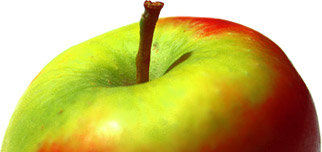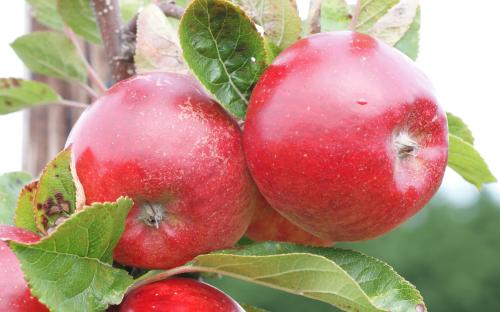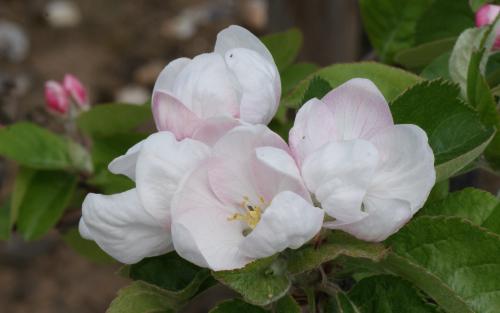
Santana's is a modern red apple with a delicately perfumed flavour. Although the predominant flavour is "apple", there is a hint of something else - a bit like lychees or roses or sweet grapes. It is slightly more noticeable where the skin is flushed red - where the apple has been exposed to the autumn sun. The flesh is creamy-yellow, and firm rather than crunchy. We don't normally describe apples by their smell, but Santana smells like it tastes !
Santana is a medium-sized apple. It is usually a deep red flushed/streaked colour, over a yellow/green background. In flavour terms it is quite similar to Spartan, which can also have scented overtones - usually described as "vinous".
Santana was developed at the University of Wageningen in the Netherlands, and is derived from Elstar, to which it has a passing resemblance. Its unique claim to fame is that it has been developed with the specific aim of minimising the levels of certain proteins which can trigger allergic reactions in a small number of people - so if you are allergic to apples but would like to be able to eat them, this variety might be worth considering.
Santana also has the Vf gene which imparts resistance to scab and it has some resistance to canker.
Santana apple identification images
All images copyright Orange Pippin unless otherwise stated.
USDA identification images for Santana
The identification paintings in the USDA Pomological Watercolor Collection span the years 1886 to 1942.
Citation: U.S. Department of Agriculture Pomological Watercolor Collection. Rare and Special Collections, National Agricultural Library, Beltsville, MD 20705.
Visitor reviews
- 19 Sep 2017 LEICS, United KingdomOrdering apples online with your groceries is not usually the best way to get a good apple - but if you are not able to get out ... This morning I had my first Santana delivered; I had never heard of it. My wife and I agree it is delicious. I tend to stick to Cox's since they tend to be okay from most sources - unlike many other well-known ones - but if I could choose this variety I would do so again. Could your website indicate where one can purchase online varieties of English apples?
- 12 Sep 2014 United KingdomI hardly recognise your description of Santana. It doesn't have a "delicate perfumed flavour". I'd say the exact opposite. It has a superb powerful sweet/sour flavour. There is nothing delicate about it! Also, the texture most certainly IS crunchy. The slightly rough skin to my mind is the sign of a good apple. Smooth waxy skins are (with the exception of Bramley) rarely a good sign. Overall one of the best varieties I have ever bought from a shop and I was absolutely staggered to find that it is new breed rather than some marvellous old type. The best comparision is a top notch cox (but tangier), though of course most shop-bought cox these days are rubbish.
- 29 Jan 2012 LONDON, United KingdomI normally can't eat apples raw as they make my throat itch and lips become bumpy, I bought this last year especially for it's hypoallergenic properties. I let one apple grow - It was quite large. I bit into it and had no reaction - I was able to eat a whole apple for the first time in over ten years. It was bliss. I am very grateful to the guys that designed it.
- 30 Nov 2011 SwitzerlandI bought "Santana". These are not small and in fact they remind me of "Idared", also for the unpleasant tough skin. Not really a favorite for me.
- 11 Jan 2011 United StatesI like this website but it should describe the apple and how it got named
- 25 Nov 2010 NOTTINGHAMSHIRE, United KingdomA delicious apple, with good texture and sweet flavourful flesh. I would say a nice size fruit for children or older people who want a smaller apple. It is one of the nicest I have tasted for many years.
Tree register
United Kingdom
- Jackie Jones in Heighington, CO DURHAM
- Patricia in Hawick, SCOTTISH BORDERS
- Wayne Seagate in Kings Lynn, NORFOLK
Belgium
- Jan Gelders in Zelem, LIMBURG
Netherlands
- Aron Jore-Van Houten in Arnhem, GELDERLAND
Origins
- Species: Malus domestica - Apple
- Originates from: Netherlands
- UK National Fruit Collection accession: 2000-110
Identification
- Awards: RHS AGM (current)
- Country of origin: Netherlands
- Period of origin: 1950 - 1999
- Fruit colour: Red
- Flower colour: White
- Leaf colour: Green
- Popularity: Rarely grown
- Annual cycle: Deciduous
Using
- Picking season: Late
- Keeping (of fruit): 1-2 months
- Flavour quality: Very good
- Flavour style (apples): Vinous
- Discoloration of fruit: Oxidising
- Cropping: Good
- Fruit persistence: Normal ripening
- Food uses: Eating fresh
- Picking period: late September
- Wildlife: RHS Plants for Pollinators
Growing
- Gardening skill: Beginner
- Flowering group: 4
- Pollinating others: Average
- Ploidy: Diploid
- Vigour: Weak growing
- Bearing regularity: Regular
- Fruit bearing: Spur-bearer
- Organic culture: Suitable
- Self-fertility: Not self-fertile
Climate
- Climate suitability: Temperate climates
- Summer average maximum temperatures: Cool ( 20-24C / 68-75F)
- Summer average maximum temperatures: Warm (25-30C / 76-85F)
- Cold hardiness (RHS): H6 (to -20C)
Other qualities
- Disease resistance: Good
- Scab (Apple and Pear): Very resistant
- Canker: Some resistance
- Powdery mildew: Some susceptibility
Where to buy trees
The following tree nurseries offer Santana apple trees for sale:
- Orange Pippin Fruit Trees (UK) United Kingdom
Santana apple trees - Keepers Nursery
United Kingdom More >>
Where to buy fresh fruit
The following orchards grow Santana:
Netherlands
Noord-Holland
- Het Keetje, Westwoud



